I was diagnosed with stage 3 colon cancer aged 34 despite being in best shape of my life – don’t ignore the embarrassing symptom I did
A mother who was diagnosed with colorectal cancer after thinking her stinky gas came from her probiotics.
Jelena Tompkins, from Colorado, was just 34 years old in 2016 when she noticed her gas smelled even stinkier than before.
The mother-of-one had just run a half marathon and was sticking to a healthy diet, although she thought it could have been something she had eaten.
Ms. Tompkins started taking probiotics to balance her gut bacteria, but the odor did not improve. Shortly afterwards she noticed blood in her stool.
Jelena Tompkins was just 34 years old in 2016 when she noticed her gas smelled stronger than normal. She was diagnosed with stage three rectal cancer


Ms. Tompkins had just run a half marathon and eaten healthily before her diagnosis. “I was in the best shape of my life,” she told The Patient Story. ‘I ate healthy and never thought I would get cancer at such a young age’
She attributed the symptoms to the probiotics, and at her annual check-up a few months later, her doctor said the bleeding was just a result of dietary changes.
But three months later, when Ms. Tompkins didn’t take the probiotics, doctors performed allergy tests to see if food intolerances had upset her digestive system.
Finally, she underwent a colonoscopy, which revealed that stage three rectal cancer had spread to her lymph nodes.
“I was in some of the best shape of my life,” Ms. Tompkins said The patient story. ‘I ate healthy and never thought I would get cancer at such a young age.’
The number of cases of colorectal cancer is increasing worldwide, creating an epidemic among young people.
Rates among young people are expected to double by 2030, and by the end of the decade, colorectal cancer is also expected to be the leading cause of cancer deaths in people under 50.
Cancers of the colon and rectum are the third most common type in the US and the third leading cause of death in both men and women.
The American Cancer Society (ACS) estimates that approximately 153,000 cases of colorectal cancer will be discovered in 2023, including 19,500 among those under 50 years of age.
About 53,000 people are expected to die from the disease this year.
Experts are still working to unravel the cause of this devastating epidemic. They often blame unhealthy diets, alcohol consumption and a sedentary lifestyle for this shift.
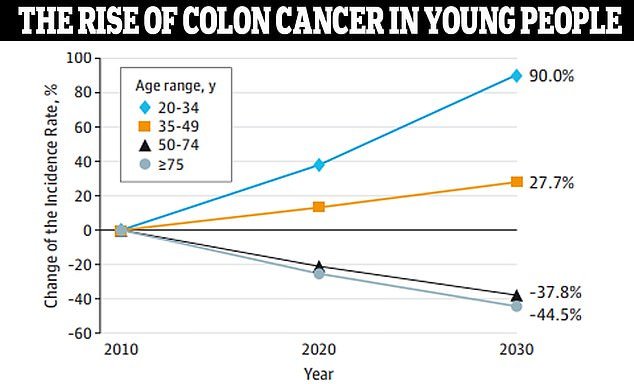
Data from JAMA Surgery shows that colon cancer is expected to increase by 90 percent in people ages 20 to 34 by 2030. Doctors aren’t sure what’s driving the mysterious increase
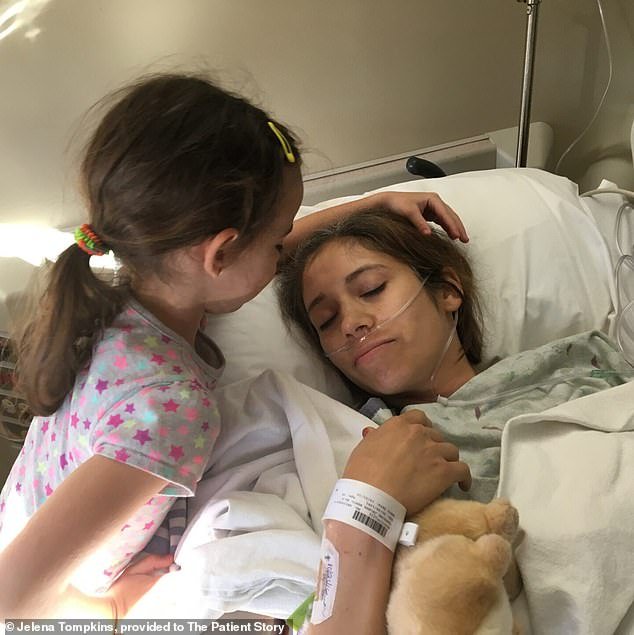
Mrs. Tompkins underwent radiation and chemotherapy, with breaks to attend her sister’s wedding and compete in a local race

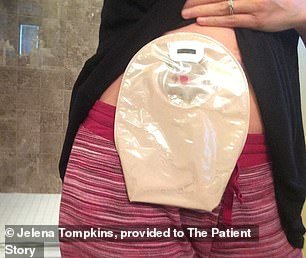
Ms Tompkins had 30 centimeters of her colon and rectum removed, as well as 17 lymph nodes, and was fitted with an ileostomy bag
Ms Tompkins underwent 28 days of radiation and the chemotherapy pill Xeloda, also known as capecitabine, which is designed for advanced colorectal cancer.
After another two months of rest, her tumor began to shrink, although she still required surgery.
Doctors removed 30 centimeters of colon and rectum, as well as 17 lymph nodes, leaving five cancerous nodes.
Mrs Tompkins had an ileostomy, in which surgeons make an opening in the abdomen and move a piece of the ileum, the lower part of the small intestine, outside the abdominal wall to create a stoma.
Digested food then passes through the stoma to an external pouch instead of through the rectum and anus.
Six weeks after surgery, she started the combination chemotherapy FOLFOX and finished in May 2017, just in time to compete in a local race.
Ms Tompkins is now in remission and is undergoing maintenance chemotherapy, along with scans once a year.
Part of what makes colorectal cancer difficult to diagnose is its symptoms, which can often be attributed to other conditions. However, some are more noticeable than others.
From a study published last year in the Journal of the National Cancer Institute found that the most commonly reported symptoms were abdominal pain, blood in the stool, diarrhea, and iron deficiency anemia.
Furthermore, a 2020 study shows Colorectal Cancer Alliance68 percent of participants said they had blood in their stool. The average age of the participants was 42 years.
The same study also found that many patients with colorectal cancer symptoms were initially misdiagnosed or rejected.
More than half of respondents said they had been misdiagnosed with conditions such as hemorrhoids, irritable bowel syndrome, anemia and mental health problems. And patients aged 19 to 39 were more likely to feel dismissed by their healthcare provider.
In one study, it took an average of ten months for colorectal cancer to be diagnosed with just one symptom. Those with at least three symptoms were diagnosed after an average of five months.
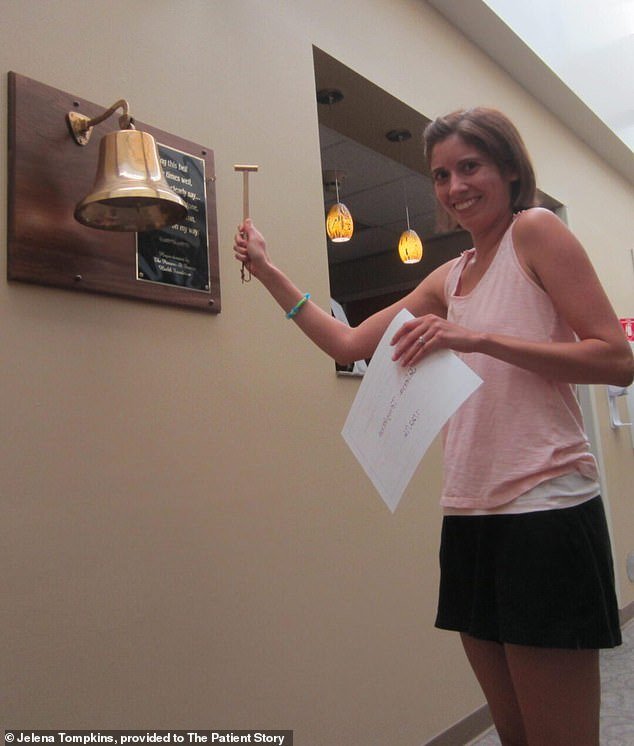
Ms Tompkins is now in remission and is receiving maintenance chemotherapy, along with scans every year to look for recurrence
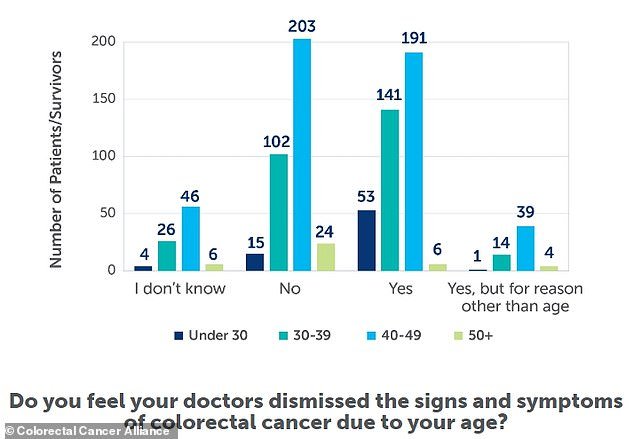
A 2020 Colorectal Cancer Alliance study found that many patients with colorectal cancer symptoms were initially misdiagnosed or dismissed
Standard colonoscopy screening begins at age 45, and Ms. Tompkins acknowledged that she was lucky her doctor didn’t neglect to order one for her.
“If they refuse a colonoscopy, tell them to put it in your file that you came to them with complaints and that they refused to give you a colonoscopy,” she said.
“That might also make them think twice about denying it.”
With no family history of cancer, Ms. Tompkins sought support from online communities of other patients.
‘We could vent to each other when we were really tired or ask, “Hey, is this bothering your system?” Or: “Oh my god, is your ileostomy going crazy too? What can you do to slow this down? What do you drink if you’re on FOLFOX and you have cold sensitivity and everything needs to be hot?” she said.
“Those are some of the things that you don’t necessarily bother your oncologist with, but having a friend who supports you can bounce ideas off of you and make you feel like you have a support group that’s there for you.” and where to go if you’re having a bad day.’
